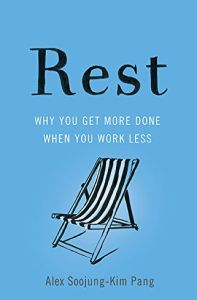Join getAbstract to access the summary!

Join getAbstract to access the summary!
Alex Soojung-Kim Pang
Rest
Why You Get More Done When You Work Less
Basic Books, 2016
What's inside?
To improve your creativity and effectiveness at work, learn to take a “deliberate rest.”
Recommendation
Are longer hours the answer to greater productivity? They’re not, according to Silicon Valley consultant Alex Soojung-Kim Pang. A workaholic lifestyle may feel like the road to success, it’s not, but the real secret to an effective, creative life is learning to practice “deliberate rest.” Pang leverages an entertaining, persuasive blend of neuroscience and anecdotes from the lives of influential figures to present his case for physical and mental rest. Pang’s explanation of why deliberate breaks enable better work repositions resting as an active endeavor, a skill to practice and a right you should claim. By showing how the best and brightest rely on skillful rest to achieve at the highest levels, Pang reveals why an addiction to empty busyness harms more than it helps. getAbstract recommends his research to self-professed workaholics and to those wanting a healthier, happier, more productive working life.
Summary
About the Author
Senior Consultant at Strategic Business Insights and former deputy editor of the Encyclopaedia Britannica Alex Soojung-Kim Pang founded The Restful Company and is former deputy editor of the Encyclopaedia Britannica. He has also worked as a technology forecaster and futurist.



















Comment on this summary